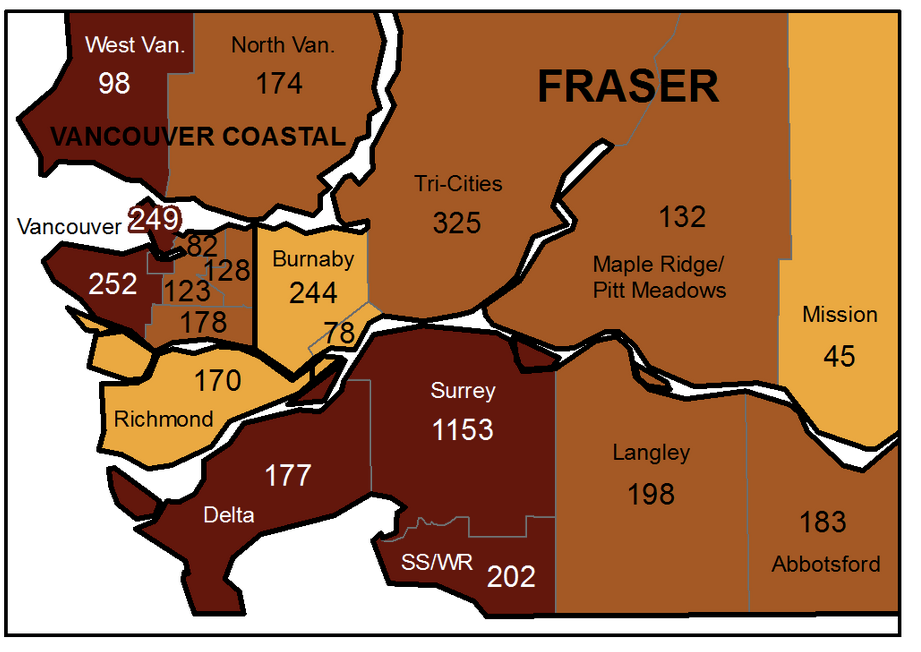The North Shore has reported its highest ever number of COVID cases.
There were 272 new cases of COVID reported in the week ending March 27, according to information released by the B.C. Centre for Disease Control. That’s dramatically higher than the 162 cases recorded the week before.
The spike in local COVID cases has put West Vancouver among the hot spots in the Lower Mainland, with an average daily infection rate of over 20 per 100,000.
There were 98 cases of COVID reported in the past week in West Vancouver – up from 38 the week before.
In North Vancouver there were 174 new cases – up from 124 the previous week. North Vancouver’s average daily infection rate now stands at between 15 and 20 per 100,000.
The soaring rates of infection on the North Shore come at a time when B.C. recorded its highest ever daily case count on Wednesday, with 1,013 new cases in the province.
West Van, Whistler both among COVID hot spots
Most of those cases have been concentrated in the Lower Mainland, where along with West Vancouver the communities of Surrey, Delta, White Rock and Vancouver are also COVID hot spots.
COVID infections in the Whistler area have also spiked, with 247 new cases recorded in the week ending March 27, which includes spring break when the resort community saw many out-of-town visitors.
The soaring number of infections in that community, which have included cases of the Brazilian variant, prompted Dr. Bonnie Henry, the province’s medical health officer, to close the ski resort for three weeks. Whistler Blackcomb has since announced it will remain closed for the remainder of the ski season.
Health authorities have not so far said what has been driving cases in West Vancouver or whether any “variants of concern” have been recorded among those.
Brazilian variant a concern in Vancouver Coastal Health
But the Brazilian variant has been reported in clusters within the Vancouver Coastal Health region.
“The UK variant is overwhelmingly in Fraser Health, the Brazilian variant is overwhelmingly in Vancouver Coastal Health, although there’s also a significant number in Interior Health,” Health Minister Adrian Dix said Wednesday in an interview with Richard Zussman of Global.
Provincewide number of cases among younger adults has been particularly concerning, said Dix.
According to B.C.’s Centre for Disease Control, COVID cases among those 20 to 39 have been increasing for the past six weeks.
Cases spiking among young adults
“What we saw last week in one day is 438 people between 20 and 39 tested positive for COVID-19,” he said.
The median age for those with the Brazilian variant form of COVID is 28, said Dix.
The Brazilian variant is particularly concerning to health officials because it has shown signs of being more resistant to vaccines.
Dix said the potential for the variants to spread quickly is a reason everyone should avoid travel except for essential purposes.
Coralynn Gehl, a West Vancouver parent who runs a Facebook site where parents exchange information on COVID exposures said she has heard of local families who didn’t heed that advice over spring break.
“I am aware that lots of people are still gathering and allowing their children together in ways they are not supposed to be doing and this is definitely contributing to spread in the community,” she said.
Gehl said she heard reports from several parents that a group of Grade 12 students took part in a trip to Tofino together over spring break and that some of those teens later travelled to Whistler.
On Wednesday the province marked a dubious milestone of over 100,000 cases since the beginning of the pandemic. B.C. had reported a total of 100,048 cases as of Wednesday with 7,405 active cases of COVID-19 in the province. There were 2,364 active cases in the Vancouver Coastal Health region.





